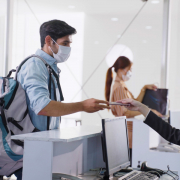The Expat Spouse: Unable To Work While Their Partners Work Abroad
/in Archived, News /by xp-adminSpouses or life partners of expatriates are often referred to as “the trailing spouse” because they followed their partners wherever they went. While the role has long-since departed from being a gender-specific one, there has also been a rise in dual career couples.
According to Marisa Jacobs, Director at Xpatweb Expatriate Solutions, this is a common problem that couples encounter when they find work offshore. “Whether coming into South Africa or working abroad, spouses often do not want to put their careers on hold, which is why they are surprised by the restrictions on their visas.”
The concerns facing partners or spouses of expatriates
If spouses wish to work in the country where their partners are on assignment, they are often required to apply for their own work permit, which is subject to approval from that country’s immigration services. This could mean having their qualifications assessed or first obtaining an offer of employment.
Slow work permit processing times, complex human resources procedures, or foreign immigration services not yet recognising non-married partners or same-sex couples, are some of the hurdles currently being encountered.
This uncertainty could hinder a spouse’s ability to integrate or settle into their new surroundings. It places an additional burden on the relocating family adding to an already stressful life event and assignment pressures.
The concerns facing unaccompanied expatriates
Many couples resort to staying in two jurisdictions, especially where the spouse or partner is unable or unwilling to put their career on hold and will not be able to work in the host country because of visa limitations. However, this too can put a lot of strain on a family.
Besides being separated from their family, the stress of being isolated in a foreign country while your family is so far away, can become unbearable. Frequent travel to visit your family can be expensive and cause some friction with their employers. The inability to adhere to required days in or out of a country, could also have serious tax implications.
“We have seen some governments recognising partners of international assignees and allowing them to work in the host country, especially where the main applicant holds a scarce skills visa to ensure they continue to attract those candidates who the country is most in need of. In South Africa this is however a more far away reality due to the high unemployment numbers. Different strategies are required on a case-by-case basis with some advance planning to assist where spouses are keen to pursue careers while ‘on assignment’,” says Jacobs.
The Permits Foundation Survey
The Permit Foundation, a not-for-profit organisation, has been campaigning to improve work permit regulations for partners of expatriates over the last ten years. Since their inception in 2001, their efforts have contributed to 35 countries implementing legislation to enable dependant work access. With a focus on achieving legislative change at government level, they’ve had a surprisingly favourable response from employers with expats under their employ.
In South Africa the Foundation has been making the recommendation that consideration be given to the issue of access to employment for legally recognised family members of critical skills visa holders and intra-corporate transferees. According to Helen Frew, Director of Permits Foundation, “Particularly in light of COVID -19, the added assurance before the decision to move, that both members of a dual careers couple can work, would help to make a huge difference to employers and mobile families and the experience from other countries shows that there would be no adverse impact on the local labour market.”
The Foundation’s first HR survey conducted in 2011 revealed that 96% of employers agreed that partners of expatriates should be allowed to work in that host country. Many companies are already aware of the concerns expats and their partners are facing, and know they run the risk of assignments being terminated prematurely because of it. As a result, many have started offering dual career support initiatives to promote family-friendly policies or to increase staff mobility and well-being.
Their latest survey is underway and promises to deliver remarkable insight into the challenges faced by expats and their partners. Expatriates and global mobility specialists are encouraged to share their views about mobile spouse and partner work authorisation.
“Permits Foundation’s work is underpinned by a strong evidence base and South Africa is a priority country for the Foundation. To help us highlight the issue of work access going forward, it is very important to us that spouses of international employees participate in our International Dual Careers survey, which runs until end November,” concludes Helen Frew.






